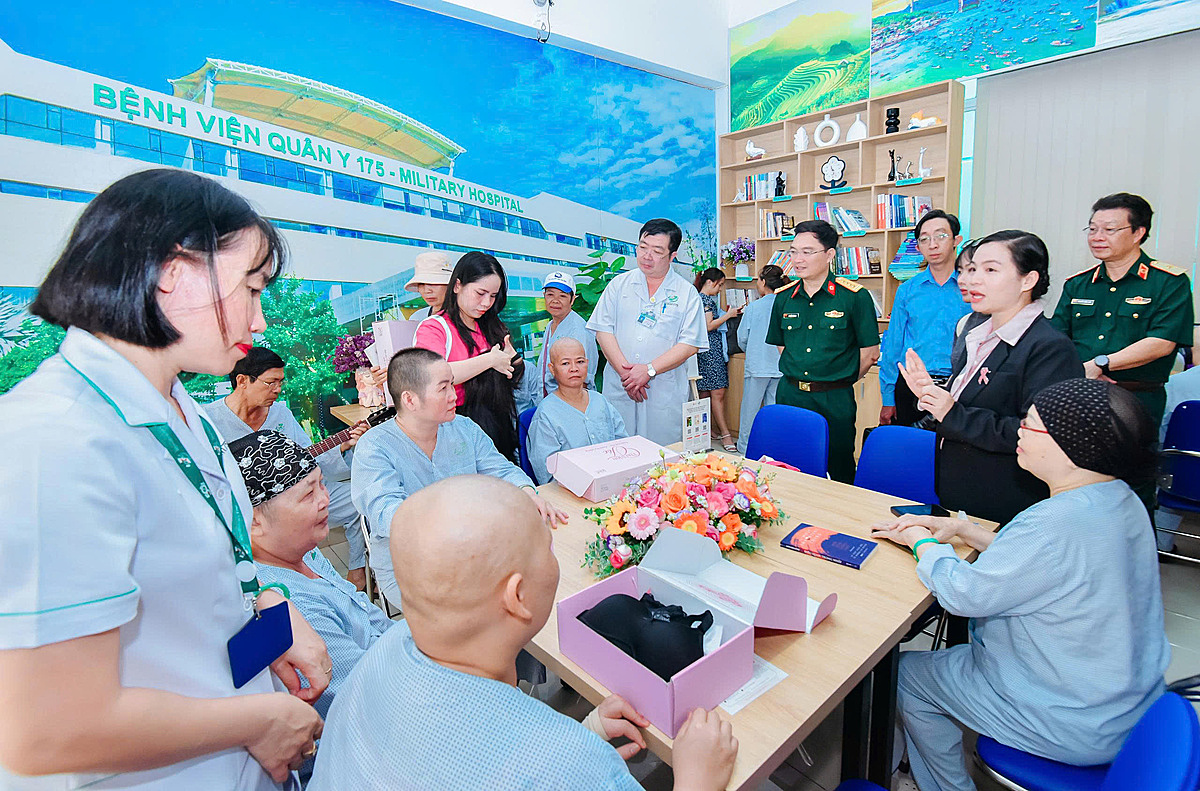54-year-old Dung, undergoing treatment for breast cancer, was one of the first patients to enter the newly opened Relaxation and Entertainment Room at the Oncology and Nuclear Medicine Institute of Military Hospital 175 on 4/9. After days of exhaustion from chemotherapy and the complete loss of her hair, she gently tried on a donated wig.
Facing her second chemotherapy session out of six tomorrow, she admitted feeling anxious and overwhelmed. "Coming to this room, listening to audiobooks, and looking at the green plants makes me feel a little lighter," she said.
 |
A 27-year-old female patient with stage 3 ovarian cancer listens to an audiobook in the Relaxation and Entertainment Room at the Oncology and Nuclear Medicine Institute, Military Hospital 175. Photo: The Lan |
A 27-year-old female patient with stage 3 ovarian cancer listens to an audiobook in the Relaxation and Entertainment Room at the Oncology and Nuclear Medicine Institute, Military Hospital 175. Photo: The Lan
Dung isn't alone in finding solace in this small room. 65-year-old Hung, who previously underwent surgery and radiation therapy for esophageal cancer, is back at the hospital for persistent back pain, awaiting a diagnosis. While waiting for the results, he visited the room and joined others in a game of chess.
"Time in the hospital can be very difficult. Here, with books, a guitar, and people to talk to, I feel less lonely," he shared.
According to Colonel, Professor, Doctor Nguyen Van Ba, Deputy Director of Military Hospital 175, a positive attitude is crucial for patients, especially those battling cancer. The relaxation room, though small, holds significant humanitarian value. It contributes to the hospital's holistic approach to healthcare, addressing both physical and emotional well-being.
A comprehensive analysis published in the journal Psycho-Oncology reveals that psychosocial interventions like cognitive-behavioral therapy (CBT) and support groups significantly reduce depression and anxiety, improving cancer patients' quality of life. Another study in the American Cancer Society's journal Cancer indicates that mindfulness-based therapies can alleviate fatigue and sleep disturbances, common side effects of chemotherapy.
Globally, relaxation rooms are integral to Integrative Medicine strategies in leading cancer centers. Advanced hospitals like the Mayo Clinic (USA) and The Royal Marsden (UK) have dedicated departments offering art therapy, yoga, meditation, and quiet spaces for patients.
The Maggie's Centres model in the UK has been particularly successful. These welcoming houses, located on hospital grounds, provide free psychological support, nutritional guidance, and community activities for patients.
Furthermore, volunteer programs like Look Good Feel Better help patients regain confidence by providing post-chemotherapy appearance guidance. These efforts aim to provide comprehensive care, recognizing emotional well-being as a cornerstone of cancer treatment.
 |
Patients in the Relaxation and Entertainment Room. Photo: The Lan |
Patients in the Relaxation and Entertainment Room. Photo: The Lan
Developed by the Social Work Department in collaboration with the Oncology and Nuclear Medicine Institute, other units, and sponsors, this project aims to nurture patients' mental health, bolster their resilience during treatment, and provide a relaxing space for medical staff to recharge.
Le Phuong












